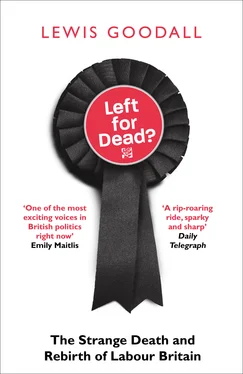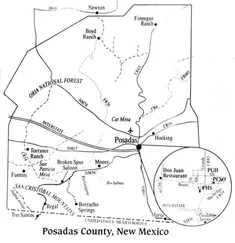Blair, interviewed standing for the 1982 Beaconsfield by-election, was alive to all this early on. He told the BBC’s Newsnight , with Michael Foot at his side:
‘The image of the Labour Party has got to be an image which is more dynamic, more modern, more suited to the 1980s. I don’t think it’s as much about right and left as people make out. We live in a different world now, 50 per cent owner-occupiers, many people working in services. Large numbers of people working in services rather than manufacturing and that means a change in attitudes and a change of attitudes we’ve got to wake up to.’ At its core, Philip Gould, Blair’s close confidant and personal pollster, wrote, would be ‘the new middle class; the aspirational working class in manual occupations and the increasingly insecure white-collar workers with middle-to-low level incomes.’ It would also include the urban poor, the inner cities, the suburbs, as David Marquand observed, every voter from ‘Diane Abbott’s Hackney as well as Gisela Stuart’s Birmingham Edgbaston’. Looked at in this way, New Labour wasn’t just a branding exercise or, ironically enough, that new: rather it was the latest version of a series of iterations of a new type of Labour Party, attempting to attract a new coalition of voters to a party whose electoral performance since the war had been lamentable.
Today there are some who argue that the New Labour victories came at too great a cost; that effectively Blair, in his courting of ‘Middle England’ and so-called ‘Mondeo Man’ and ‘Worcester Woman’, hemmed himself in, reduced Labour’s room for manoeuvre, and reined in radicalism all in the name of respectability, and that this was unnecessary. The academic Neal Lawson, for example, has argued that Blair’s 1997 majority was too large: ‘The tent was too big and you spent the next ten years trying to keep the wrong people in it: the very rich, for example.’ 1
That a political party is electorally successful but then spends the years afterwards self-flagellating because it had the wrong sort of votes cast by the wrong voters seems to me an argument that only the Labour Party could have. But even taken on its own terms, there are two key reasons why it is a wretched analysis. For a start it’s ahistorical. It looks that way now because Blair did achieve what he did. It seems the party was destined to win and win big. That is not how it seemed at the time: Labour politicians did not have the reassuring benefit of hindsight that we possess. Read any diary entry, any memoir or account of that period, and the scars of four successive defeats run deep in the psyches of the Labour politicians of the age. Even though the party had been ahead in the polls for years, even though the country was thoroughly sick of the Tory government, it didn’t seem a certainty that Labour would finally get over the line. Chris Mullin, in his safe Labour seat of Sunderland Central, still didn’t think it was going to happen until the last moments, as his diary entry from 24 April 1997 (exactly a week before polling day) records:
We’re going to lose. Blair knows it, too. I can see it in his eyes every time he appears on the TV news. The magic is fading. He looks exhausted. Major, by contrast, is as fresh as a daisy. The massive rubbishing to which our man has been subjected is paying off. The Tories have succeeded in turning him from an asset to a liability.2
Moreover (ironically given the accusation that all Blair wanted to do was achieve office at any cost), getting into government was not New Labour’s only aim. Blair’s objective was not to secure power once. Lawson is probably right that most (though by no means all) mainstream Labour leaders in 1997 would have won – the country was sick of the Tories after 18 years and the democratic elastic had been stretched to its maximum. But that was not the sum of Blair’s or Brown’s ambition. They wanted to govern for a sustained period in office. At the time that was mistaken for pragmatism over principle, but up to then one of the key critiques of the Labour Party was that it had never been able to enact a truly transformative programme because it had never governed for long enough – that too is forgotten now. Rather it had had periods of minority government followed by the stop-start governments of the 1940s and 1950s and especially the 1960s and 1970s. Blair didn’t believe that simply expelling the Tories from office every now and again was enough: he wanted to, in effect, displace them as the natural party of government. Listen to any speech, read any pamphlet written by Blair or Brown at the time, and the idea of securing that objective drips off the page; that, in their view, required fundamental political accommodations. In the 1940s, after the Labour government enacted some truly socialist policies, socialists were dismayed not just at losing office in the 1950s but because the scales fell from their eyes. Part of the ideological makeup of prewar socialism was that once the working class had had a taste of the truly transformative powers of the ideology, it would usher in a golden age in which Labour would rarely be dislodged. History had not turned out that way and Blair’s generation held no such illusions; they assumed they must act accordingly.
But there’s another reason why it’s easy to ridicule the Blair big tent, why it seems almost quaint as a political notion: because, for good or ill, it was precisely that – a big tent. Blair genuinely believed his was a new approach, a new conception of politics, and that much of the population could be brought into the tent’s shelter. His politics was not one based on antagonism but on unity. The contrast with what came before him, of Margaret Thatcher’s constant quest for enemies to slay, of her rhetoric of ‘our people’ and ‘one of us’, was a million miles away from Blair’s soft and conciliatory tones, of ‘one people’, transcending left, right and all the old dogmas. Francis Urquhart would not have approved. In as much as anything, this was rooted in Blair’s personality, in a tremendous self-belief in his own persuasive abilities and capacity to bring people together. As Professor David Marquand argued years later: ‘the central premise of his statecraft was that society was naturally harmonious: that apparent differences of interest or belief could always be compromised or transcended’.3
That contrast is not only striking for what came before Blair but for what has come since. New Labour’s big tent partly seems so kitsch because its open and pluralist approach seems so foreign to the politics of our own age. Today’s politics, of remain and leave, of heroes and villains, of identity politics, of authenticity and virtue and vice, is a politics that fundamentally rests on enmity just as much as did that which characterised the 1980s. It relies on showing who you are for and who you are against and in so doing revealing your truly authentic self. In this regard, the bonhomie of the settled politics of Blair’s 1990s seems as distant as Baldwin’s 1930s or Macmillan’s 1950s – indeed our own politics has manifested itself to some extent as a counter-reaction to it. Consequently, Blairism can appear unprincipled or rootless. The ‘authenticity’ of big characters like Donald Trump, Nigel Farage, Jeremy Corbyn and the rest must surely arise as a counter-reaction to the 1990s era of spin, PR politics and the idea of politicians trying to please all of the people all of the time. Better, it is said, to have politicians who really say what they think, even at the risk of being divisive, rather than those who try to be all things to all people. Today, as Britain is ravaged by new political and cultural schisms, I’ve lost count of the number of times I’ve heard friends or colleagues or columnists yearn aloud for a unifier, a politics less coarse, less bellicose, someone or something that can bring people together. Yet it was exactly that sort of openness, and its accompanying rootlessness, which so many came to revile and which now makes Blair’s approach seem so antiquated and his political personality dismissed as a libertine.
Читать дальше












